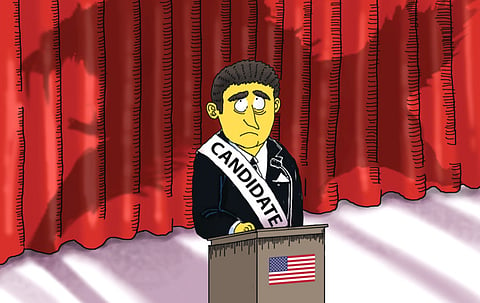Terror question for future US president
The actions of any future occupant of White House, in case of a major terror strike, should be taken into account

At a moment when every American presidential candidate is vying to convince voters that he or she is best equipped to protect the country against terrorists, here is a question that is not being asked, but ought to be: Who is best prepared to cope with the aftermath of a major terrorist attack? Not the human or the military aftermath, mind you: The social aftermath.
This is important for two reasons. First, it seems likely — almost inevitable — that sooner or later, there will be another big attack in the United States.
On Christmas Day, 2009, a man linked to Al Qaida in the Arabian Peninsula attempted to detonate a bomb concealed in his underwear on a flight bound for the US. The following year, an attempt to set off a car bomb in New York’s Times Square failed only because alert witnesses spotted smoke coming from the vehicle and because the bomb itself was poorly constructed. That attack was traced back to the Pakistani Taliban.
The Tsarnaev Brothers succeeded in killing three people and injuring more than 260 near the finish line of the 2013 Boston Marathon, though in attacking such a crowded area, their goal was clearly to kill dozens, perhaps several hundred, people. Eventually something along these lines is going to succeed.
The second reason why it is important to understand how potential presidents will react to a mass casualty attack is because if there is even a hint of a link to the Middle East or Islam, the backlash is going to be ugly. Each of the attacks listed above prompted debate in the US about whether accused terrorists should be tried in civilian courts or handed over to the military as “enemy combatants”. If civilian courts prevail (and in these instances they did), should the accused get the same rights as other criminal defendants in the US? The fact that this question is even asked shows how much the debate has shifted over the last decade.
What interests me today, however, is how the aftermath of an attack will ripple through society at large.
The most telling political contrast of the last few months came in the wake of last November’s Paris attacks. As the French capital struggled to make sense of what had happened, French President Francois Hollande went out of his way to declare that the atrocity would not alter France’s plans to take in refugees from the Middle East and North Africa. Meanwhile, American politicians were tripping over each other to call for the US to stop accepting Middle Eastern refugees at all. Those calls accelerated three weeks later after the attacks in San Bernardino, California.
Significant number of voters
Since then, we have seen Donald Trump call for a blanket ban on Muslims entering the US. While many, many political figures on both sides of the aisle denounced this, it is also clear that his idea resonated with a significant number of American voters. Reporters covering the Trump campaign have repeatedly noted the bellicose, and frequently anti-Muslim, attitudes of crowds who turn out to see the real-estate-developer-turned-reality-TV-star-turned-GOP-frontrunner.
After Trump’s announcement, the mayor of one Virginia city (a Democrat, by the way) issued a statement that seemed to call on the US to consider putting American Muslims in internment camps, as the government did with Japanese-Americans during the Second World War. The mayor backtracked in the face of a storm of criticism, but if something on the scale of what happened in Paris were to happen in New York or Chicago it is easy to imagine many people changing their view of the mayor from ‘bigot’ to ‘prudent public servant’.
In mid-December, a Gallup poll offered American respondents (not just Republicans) a menu of 11 anti-terrorism actions and asked them to say, which ones sounded effective. The item that came top of the list was increased US air strikes against Daesh (the self-proclaimed Islamic State of Iraq and the Levant), chosen by 79 per cent of those polled.
Blatantly anti-Muslim actions came in at the bottom of the list — but they still enjoyed significant support. Asked whether “a new law that would prevent any Muslim from entering the US” would be an effective counter-terror measure, 38 per cent said yes. Almost as many — 32 per cent — backed requiring “Muslims, including those who are US citizens, to carry a special ID”. Bear in mind that the US does not issue national ID cards and that common forms of identification, such as drivers licences and passports, do not include the holder’s religion. Indeed, in the US, asking questions about religion is generally illegal during a job interview or on almost any form one might be asked to fill out (opening a bank account, for example).
Anyone who thinks that in the wake of another 9/11 there will not be tremendous pressure to change all that is, frankly, naive.
The question that needs to be asked in this political season is which candidates are going to be willing to confront this fear and paranoia when the time comes and which ones will take the easy — and, at the moment, popular — way out.
Gordon Robison, a longtime Middle East journalist and US political analyst, teaches political science at the University of Vermont.



